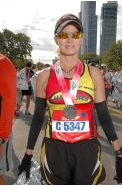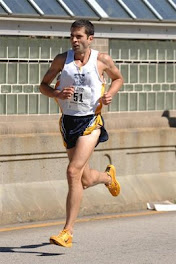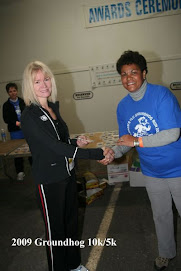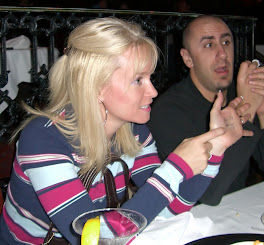I am not a particularly talented runner, and I took my very first running step in August of 2005. I'd never run more than two miles until my first 5K the following October (truly amazed that I could tack another 1.1 miles of running onto that!). But, I had the dream first of running a marathon; and then, somehow after actually running one in March 2007, of reaching the seemingly impossible goal for the ordinary runner: Run a marathon in 3:50:59 or less and meet the qualifying standard to run in the Boston Marathon.
My third marathon, I thought I had a real shot at it, Ottawa, Canada in May of 2008. Riddled with many mid-race problems, I missed it by a long shot, running a 4:04. I really wasn't sure the 3:50 was going to be doable. I tried again in Chicago, October 2008, during one of the two really hot years, holding on strong and right on target past mile 22, when the heat finally got to me and I slowed enough to miss it by three minutes and fourteen seconds. But I came away with the knowledge that this goal was possible! I would try again.
It was another full year before I ran another marathon. And there are many factors that led to my success. But I didn't want to run another race where I was targeted to slide under the wire where if something minor happened, I'd miss my shot. I wanted to have a buffer--in case anything went wrong--and if it went right, I wanted to crush it! As you know, Chicago 2009 had a very happy ending for me, running a 3:38:22, easily qualifying for Boston.
Here are some of the key pieces that led to my success.
1. An entire season devoted to the 5K. You know, it's really a different sport, racing a 5K vs. racing a marathon. We're not talking about completing the distance. I mean, train specifically for the distance and a finishing time, and racing your hardest, leveraging your competitiveness, learning to "red line." But it made me into a totally different runner. I got my "edge" this Spring, running 5K after 5K, and having Vince train me specifically for that (very hard for me) 22:00 goal. I not only achieved this goal--I gained my edge, I gained strength I didn't know I had, and I significantly lowered my lactate threshold. In other words, I learned to sustain a 7:00 pace for a long enough time, that 8:20s became easy. So easy, in fact, I claimed it was my "forever pace," and sure enough, it's what I ran in Chicago. One 8:20 after another.
2. Marathon Pace "ready." I was heavily exposed to the concept of running much harder than marathon pace when tired: through 5K training, threshold training, mile and 2-mile repeats, and some workouts that Vince gave me at the end on my long runs where I would vary between marathon pace and something faster / harder, then back again to MP without recovery. By the time I was really, really tired in the marathon (and remember, I started to hurt by halfway), I kept drawing on those earlier workouts--remembering how I really could finish them. "I know I can do this; I've run harder when really tired and kept going." There's nothing like knocking out a dozen miles, after warm-up, most at MP then throwing in some miles that were 30-40 seconds faster, then back to MP. What I experienced in those final miles in Chicago was not any harder effort than some moments in a few of those memorable workouts I'd done; just a little more painful.
3. Diet. I took my diet very seriously, following a few key rules: no junk food, no fried food, high carbs only right before and right after a run, high protein at other times, lots of fresh foods (think: shop the perimeter of the grocery store and skip the aisles) and moderate portions only. I started marathon training a bit on the heavy side for my small-boned 5'6" frame. I was somewhere around 113-114#, even up to the week of Flagstaff. But, something happened when I came back; and it really wasn't intentional. Gradually, week by week, a pound or so would come off. And by race day I was and had been 106 pounds for a bit. But, I was very strong. I never deprived my body of the foods needed to fuel and restore me. Being lighter will help your marathon time dramatically--provided you have it to lose and go about it in a healthy way.
4. No LSD. Not that kind of LSD. I mean long, slow, distance. OK, I'm going to alienate just about every training program out there, but I will tell you, I am not a proponent of LSD. If you train and run all your miles in your long runs 60-120 seconds slower than race pace, not only will you find "injuries" during the race, but you simply cannot sustain "race pace." I've seen it happen so many times. Race pace must be practiced. A lot. Even my long runs sometimes included miles BELOW race pace to teach my body to be completely comfortable to run 26.2 miles AT race pace and / or to simulate the exhaustion later in the marathon with shorter distances. I had to be able to run MP "forever," because I promise, everything after mile 21 WAS forever. It's a fine line, though. I was careful not to leave my best run in my training logs and kept my warm-ups nice and slow. I kept the adage "save it for the starting line" clearly in mind.
5. Having a coach. Ok, Vince is seriously responsible for guiding this huge transformation in me. I've been working with him and the RUN SMART Project for over two years now, and have already committed to him through Boston (unless he fires me). If you really want to leverage your best ability and increase in a healthy manner, I highly recommend having a coach, a mentor, or someone to guide you through the process. Not only did Vince push me when I needed to be pushed, but more importantly, he held me back when I wanted to be pushed harder. As a runner who experiences the wealth of newly found fitness, I would often want to "test it out." Vince somehow managed to keep me reined in. I spent the last two seasons completely healthy, and walked off of Chicago completely healthy and ready to train again.
6. Toughness. I don't really know how to describe this, but I felt it forming in me as I learned to race 5Ks. I referred to it as my "edge" earlier. There were several things I read that motivated me; helped me to understand that I can run through pain and I can keep going when I want to quit. And I don't mean keep going when it gets a little tough; I mean keep going when just about anyone else really would quit or slow down at least. But if you want to achieve your greatest; this is a quality that must be learned; embraced. I kept thinking (during the marathon) about how the runners who ran with Dean in the 50 marathons / 50 states / 50 days would "plan" to drop at the half marathon point, but none of them ever did--not one. Even when they weren't trained. The human body is capable of such a greater effort than we give it credit. You just have to learn how to dig deep and leverage it. And that's what racing is all about. Your fitness will only get you so far to your greatest achievement. It was my grit that brought me to the finish line in 3:38:22, and not 3:50:59... or slower.
I am enjoying the glow of registering and planning for Boston. What did it take? Everything I had. Make no mistake: qualifying for Boston was payment on an investment I made long ago; and continued my contributions daily over an extended period of time. I did not "get lucky." I took care to pay attention to every detail, and overlooked nothing. What I discussed above in many ways are over-simplifications, but were areas of critical importance in my success.
But I do want to stress what an "ordinary" runner I am. I have no special abilities; no previous running experience. No fitness from earlier years to regain. I was not a 6:00 miler in college. I started this with nothing. And built on it, brick after brick. And when I had set backs, I tried again and didn't quit. I hope that if any of you aspire to a goal such as qualifying for Boston that maybe my message has helped. If I can do it--surely--you can too! I promise you--it is worth it!
I have already had my first few runs back. I wish I knew all of my goals for the next year, but I haven't even nailed my pace down for Boston yet. I am thinking of a 5K PR in January, followed by a New York qualifying time for guaranteed entry at Boston (3:38:00). But, doing well in Boston brings its challenges; this is not an easy course. I have much to learn and a great deal to work on!
I thank so many of your for following me and inspiring me along the way. We all have our challenges to overcome. Most of you have touched my running career in some way. But, I promise, it is not a career that is ending. I believe I have a few years of improvement ahead of me, and plan to leverage that to the best of my ability. My real goal is to set a world record when I'm 80 :-)
Lace 'Em Up For Boston!
12 years ago


















_s_jpg.jpg)








